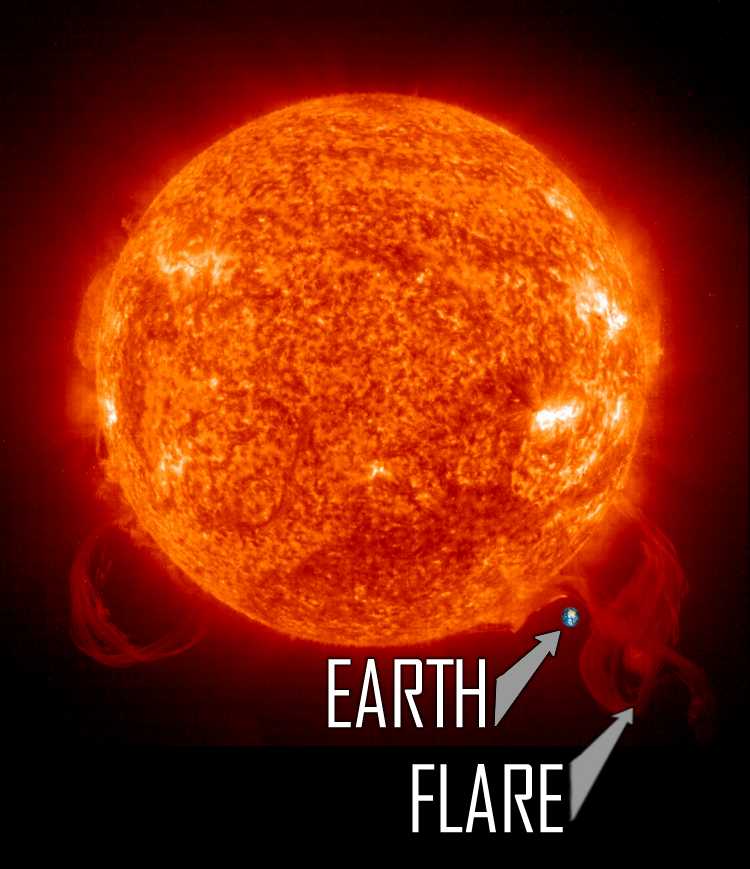NASA: Solar flares from ‘huge space storm’ will cause devastation
June 16, 2010
Telegraph
Britain could face widespread power blackouts and be left without critical communication signals for long periods of time, after the earth is hit by a once-in-a-generation “space storm”, Nasa has warned.

National power grids could overheat and air travel severely disrupted while electronic items, navigation devices and major satellites could stop working.
National power grids could overheat and air travel severely disrupted while electronic items, navigation devices and major satellites could stop working after the Sun reaches its maximum power in a few years.
Senior space agency scientists believe the Earth will be hit with unprecedented levels of magnetic energy from solar flares after the Sun wakes “from a deep slumber” sometime around 2013, The Daily Telegraph can disclose.
In a new warning, Nasa said the super storm would hit like “a bolt of lightning” and could cause catastrophic consequences for the world’s health, emergency services and national security unless precautions are taken.
Scientists believe it could damage everything from emergency services’ systems, hospital equipment, banking systems and air traffic control devices, through to “everyday” items such as home computers, iPods and Sat Navs.
Due to humans’ heavy reliance on electronic devices, which are sensitive to magnetic energy, the storm could leave a multi-billion pound damage bill and “potentially devastating” problems for governments.
“We know it is coming but we don’t know how bad it is going to be,” Dr Richard Fisher, the director of Nasa’s Heliophysics division, said in an interview with The Daily Telegraph.
“It will disrupt communication devices such as satellites and car navigations, air travel, the banking system, our computers, everything that is electronic. It will cause major problems for the world.
“Large areas will be without electricity power and to repair that damage will be hard as that takes time.”
Dr Fisher added: “Systems will just not work. The flares change the magnetic field on the earth that is rapid and like a lightning bolt. That is the solar affect.”
A “space weather” conference in Washington DC last week, attended by Nasa scientists, policy-makers, researchers and government officials, was told of similar warnings.
While scientists have previously told of the dangers of the storm, Dr Fisher’s comments are the most comprehensive warnings from Nasa to date.
Dr Fisher, 69, said the storm, which will cause the Sun to reach temperatures of more than 10,000 F (5500C), occurred only a few times over a person’s life.
Every 22 years the Sun’s magnetic energy cycle peaks while the number of sun spots – or flares – hits a maximum level every 11 years.
Dr Fisher, a Nasa scientist for 20 years, said these two events would combine in 2013 to produce huge levels of radiation.
He said large swathes of the world could face being without power for several months, although he admitted that was unlikely.
A more likely scenario was that large areas, including northern Europe and Britain which have “fragile” power grids, would be without power and access to electronic devices for hours, possibly even days.
He said preparations were similar to those in a hurricane season, where authorities knew a problem was imminent but did not know how serious it would be.
“I think the issue is now that modern society is so dependent on electronics, mobile phones and satellites, much more so than the last time this occurred,” he said.
“There is a severe economic impact from this. We take it very seriously. The economic impact could be like a large, major hurricane or storm.”
The National Academy of Sciences warned two years ago that power grids, GPS navigation, air travel, financial services and emergency radio communications could “all be knocked out by intense solar activity”.
It warned a powerful solar storm could cause “twenty times more economic damage than Hurricane Katrina”. That storm devastated New Orleans in 2005 and left an estimated damage bill of more than $125bn (£85bn).
Dr Fisher said precautions could be taken including creating back up systems for hospitals and power grids and allow development on satellite “safe modes”.
“If you know that a hazard is coming … and you have time enough to prepare and take precautions, then you can avoid trouble,” he added.
His division, a department of the Science Mission Directorate at Nasa headquarters in Washington DC, which investigates the Sun’s influence on the earth, uses dozens of satellites to study the threat.
The government has said it was aware of the threat and “contingency plans were in place” to cope with the fall out from such a storm.
These included allowing for certain transformers at the edge of the National Grid to be temporarily switched off and to improve voltage levels throughout the network.
The National Risk Register, established in 2008 to identify different dangers to Britain, also has “comprehensive” plans on how to handle a complete outage of electricity supplies.
Watch Dr. Richard Fisher’s explanation here.
